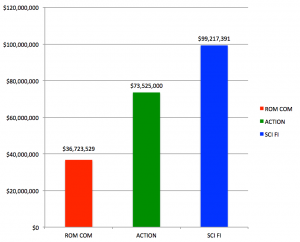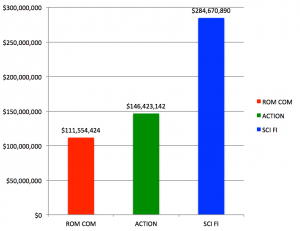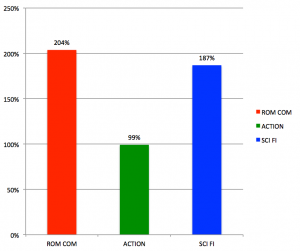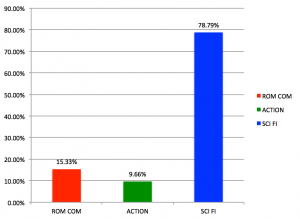Are Romantic Comedies Profitable?
/For years, the film industry has mourned the death of the romantic comedy. According to the Hollywood Reporter, romantic comedies don't travel well to cultures and languages overseas where Hollywood makes at least 75% of its revenue. Furthermore, romantic comedies, by definition, don't lend themselves to sequels. According to the Scoggins Report, there were only two comedy spec screenplay sales in Q1, 2015, neither of which was a romantic comedy. Studios now rarely invest in rom-coms, as they are no longer considered a profitable genre.
But are these assumptions correct?
Are romantic comedies really an unprofitable genre? And do rom-coms fail overseas?
Looking at the data for all movies released theatrically from 2009 - 2015, romantic comedies are actually extremely profitable both domestically and overseas. I scraped the available box office data from BoxOfficeMojo.com and crunched the numbers below.
In terms of gross profit, rom-coms handily outperformed my two control groups: action and sci fi. Net profit is trickier to evaluate, and I will address that below. But first, the overall numbers:
Average Budgets (2009 - 2015)
Rom-coms are significantly less expensive to produce than action or sci fi (click image to enlarge):
Average Worldwide Gross (2009 - 2015)
The average rom-com earns less revenue than the average action or sci fi movie:
Average Gross Profit (2009 - 2015)
"Gross profit" here is worldwide revenue-divided-by-budget. For all genres, this number does not account for the exhibitor's split, or P&A (addressed below).
In box office gross, the average romantic comedy is more profitable than either action or sci fi. In fact, the average rom-com grosses three times its budget. This is because the rom com budget is typically half that of action movies and one third that of sci fi, so rom-coms are a much smaller financial outlay. It is worth noting that while studios have avoided rom-coms over the past five years, rom-coms still show a healthy 200% profit margin in this time period, soundly outperforming both action and sci fi.
Studios are run by very, very smart people who wouldn't avoid rom-coms without good reason. So if rom-coms are clearly less expensive and more profitable than action or sci fi movies, why do studios avoid them?
Marketing
According to Steven Soderbergh, the answer may lie in studio marketing budgets. If you add a flat $60 million marketing budget to each genre, it radically changes the profit percentages. In this hypothetical, rom-coms still earn a greater profit than action movies, but nowhere near as strong a profit as sci fi.
We have no transparency on studio marketing budgets, so it's difficult to know what studios spend on marketing and how effectively they spend it. It seems reasonable to assume that p&a budgets should be dropping as the internet revolutionizes marketing, but marketing budgets continue to sky-rocket.
Consider the fact that 87% of Twitter users claim that tweets influence their movie choices. Yet studios continue to spend more than half their marketing budgets on TV spots in the face of mounting evidence that TV advertising is increasingly inefficient.
Transformers: Age of Extinction spent $100 million on domestic print-and-advertising alone. Meanwhile, the average studio spends as much as half-a-billion on marketing annually. With no transparency on these numbers, there can be no critical evaluation. The MPAA stopped tracking studio marketing spends in 2007, and there is no public breakdown of marketing budgets per movie.

Studios now tend to avoid mid-budget movies of any genre, which cuts out rom-coms entirely. It may be that mini-majors and large financiers may find a way to fill this mid-budget gap in the film ecosystem, and fill the under-served demographic of movie-goers who love romantic comedies. As long as film companies learn to market rom-coms economically, this genre is demonstrably more cost efficient and profitable than action or sci fi.
The big takeaway from the numbers above is that rom-coms actually do perform profitably internationally. But as studios focus their marketing dollars on fewer movies each year, they are under pressure to invest in gigantic movies that will help them reach billion dollar annual grosses. Publicly traded companies need to show growing revenue year-over-year, and it is easier for a studio to reach billions in grosses by investing in $200 million movies than in small, yet profitable, romantic comedies. Perhaps if studios were still privately held, their emphasis might be on greater profitability rather than increasing revenues.



